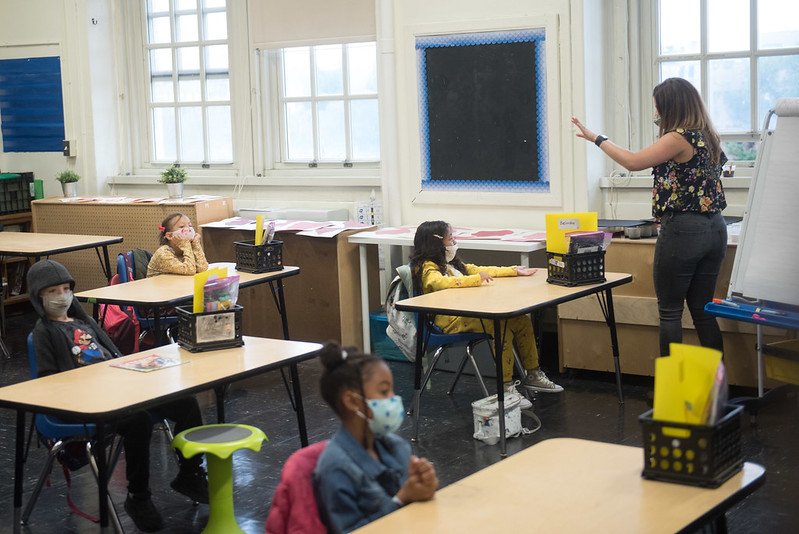
Students return to schools (photo: Michael Appleton/Mayoral Photography Office)
Black, brown, and indigenous students are suspended from school more than any racial or ethnic groups in the United States. This disproportionality exacerbates educational inequities. By controlling misbehavior, rather than correcting it, excessive school discipline has lifelong negative impacts on well-being, academic, and professional success.
The long-term consequences of racially-biased discipline in schools will be even more devastating in a school year as unique and challenging as this one, when the most fragile children, with the greatest need, will return to schools that are chronically under-resourced.
Too many children of color already suffer the irreparable harm of racism and its related diseases, such as poverty, chronic illness, housing instability, and excessive punishment. Today they are experiencing heightened anxiety and depression as the coronavirus decimates their communities and they are isolated from their friends and usual support networks. They are understandably fearful as their parents lose their jobs and struggle to keep their home. Too many are grieving the loss of loved ones and caregivers.
As young people return and acclimate to their COVID-19-modified classrooms, their existing trauma and mental health struggles will become apparent. Teachers are accustomed to the usual jitters associated with the “back to school” transition from summer recess; this year we must be prepared for so much more. Grief and anxiety will manifest in a multitude of ways. Some children will act out. Others will withdraw. All this, in the context of new rules and pressures to wear masks, wash hands, keep distance from friends and teachers, and more. How can we enforce these mandates without penalizing students? Will we be punishing, or act supportively and sensitively? What is our track record?
Given that the New York City Department of Education has not provided guidance on disciplinary practices, schools are being left to determine appropriate protocols individually.
As parents, educators, and neighbors, we must respond with empathy, kindness, and equity above all else. Children need the opportunity to reflect upon their actions and work through the struggles they may be experiencing. If a parent or teacher immediately reacts angrily toward a child without examining context, a child is likely to become even more confused, afraid, or withdrawn. Adults are anxious too, complicating the response.
Make no mistake: responding to a child’s trauma with punitive action will cause harm. It will re-traumatize the child and compound suffering in an already painful circumstance.
Children get their cues from adults, especially during times of extreme stress. They look to us for guidance on how to navigate unusual experiences. Our behavior sends particularly important messages at times like these. When a child “misbehaves,” it’s almost never malevolent. Meltdowns, outbursts, or aggressive gestures signal an underdeveloped ability to deal with transition, disappointment, or disagreement. Misbehaviors may also be signs of trauma. That’s why it’s important to respond by asking the child questions about what they are experiencing in the moment, encouraging them to articulate what is underneath their fear, angst, or reclusion.
Teachers across the country are rightly asking for training on how to support and work with traumatized children. Caregivers should likewise feel empowered to lean on external support systems. At JCCA, for example, we offer individualized family therapy and support services for any family on Medicaid, and already serve over 17,000 children in New York. Parents should also look to mental health counselors and social workers embedded in their schools, who are available remotely to help a child and their family work through the avalanche of challenges stemming from COVID-19.
The pandemic poses many challenges to educators, students, and families. At the forefront should be the challenge of how to address and heal the inequities of our school system—not perpetuate them.
Supportive resources are accessible to parents in well-funded school districts, but scarce in the communities hardest-hit by COVID-19; we must marshal every advocacy and funding opportunity to correct this inequity. In the meantime, all of us can help prevent moments of duress by proactively checking in with kids, asking how they are feeling and affirming the sources of support they can rely on.
As children return to school, we cannot underestimate how the pandemic has turned their world upside down and how it will continue to affect them in the months ahead, especially for students of color. How we respond to their pain in this moment will leave a lasting imprint on their lives, and on the strength of generations to come.
***
Ronald E. Richter is CEO of JCCA. On Twitter @RichterJCCACEO.
***
Have an op-ed idea or submission for Gotham Gazette? Email This email address is being protected from spambots. You need JavaScript enabled to view it.




